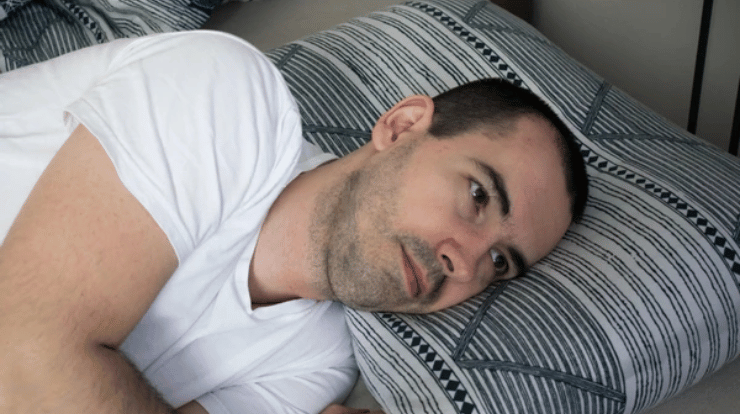
Talking in your sleep, also known as somniloquy, is a common phenomenon that occurs during the stage of sleep known as REM (rapid eye movement) sleep. During this stage of sleep, the body becomes paralyzed and the brain becomes more active, leading to vivid dreaming. It is during this stage of sleep that people may talk in their sleep, although it can also occur during other stages of sleep.
Somniloquy is usually benign and does not require treatment. However, if you are concerned about talking in your sleep, you may want to speak with your healthcare provider or a sleep specialist to rule out any underlying medical conditions that may be causing it.
Causes of Talking in Sleep
Talking in your sleep is a common sleep disorder that can occur at any age. It is more common in children and tends to occur during the deeper stages of sleep. It can be caused by a variety of factors, including:
1. Stress or emotional turmoil:
Stress, anxiety, and other emotions can trigger sleep talking. During sleep, the body’s natural defenses are relaxed, and unresolved emotional issues may surface in the form of sleep-talking.
2. Sleep deprivation:
Lack of sleep can lead to sleep talking. When the body is sleep deprived, it may try to compensate by going into deeper stages of sleep, during which sleep talking is more likely to occur.
3. Alcohol or drug use:
Alcohol and certain medications can increase the risk of sleep talking. Alcohol and drugs can disrupt the normal sleep cycle, leading to talking in sleep.
4. Sleep disorders:
Sleep disorders such as sleep apnea or restless leg syndrome can cause sleep talking. These disorders can disrupt the normal sleep cycle, leading to talking in sleep.
5. Medical conditions:
Certain medical conditions, such as fever, can lead to sleep talking. In these cases, the sleep talking is usually temporary and will resolve once the underlying medical condition is treated.
In most cases, sleep talking is a harmless condition and does not require treatment. However, if you are concerned about your sleep talking or if it is affecting your sleep or daily life, it is important to speak with a healthcare provider. They can help determine the cause of your sleep talking and recommend appropriate treatment options.

How to stop talking in your sleep?
There are several strategies you can try to stop talking in your sleep:
1. Get enough sleep:
Make sure you are getting enough sleep at night. Aim for 7-9 hours of sleep per night.
2. Practice good sleep hygiene:
Establish a regular sleep schedule and create a relaxing bedtime routine. Avoid caffeine, alcohol, and screens before bedtime. Create a cool, dark, and quiet sleep environment. Avoid napping during the day and avoid stimulating activities before bedtime.
3. Reduce stress:
Try relaxation techniques such as deep breathing, meditation, or yoga to reduce stress and improve sleep. Avoid stimulating activities before bedtime, and try to relax your mind and body before going to sleep.
4. Treat any underlying medical conditions:
If you have a medical condition that is causing your sleep-talking, treating the condition may help stop sleep-talking.
5. Consider using white noise:
White noise can help mask background noise and create a calming atmosphere, which may help reduce sleep talking. You can use a white noise machine, a fan, or soothing music to create white noise.
6. Seek treatment for sleep disorders:
If you have a sleep disorder such as sleep apnea, treatment can help stop sleep talking.
7. Try medication:
In some cases, medication may be used to treat sleep talking. However, it is important to speak with a healthcare provider before taking any medication.
Practice good sleep habits: Make sure you are comfortable when you sleep and try to relax before bedtime. Avoid stimulating activities before bedtime, and try to create a relaxing sleep environment.
Talking in Sleep with Eyes Open
Talking in your sleep with the eyes open is a rare sleep disorder called nocturnal lagophthalmos. It is characterized by the inability to fully close the eyelids during sleep, which can lead to dry eye and discomfort. In some cases, it may also be accompanied by sleep talking.
What causes nocturnal lagophthalmos?
Nocturnal lagophthalmos can be caused by a variety of factors, including nerve damage, facial muscle weakness, or certain medical conditions such as diabetes or thyroid disorders. In some cases, it may also be caused by certain medications or alcohol use.
How is nocturnal lagophthalmos treated?
If you are experiencing nocturnal lagophthalmos and are having difficulty closing your eyelids during sleep, it is important to speak with a healthcare provider. They can help determine the cause of your symptoms and recommend appropriate treatment options. Treatment may include the use of lubricating eye drops, eyepatches, or medication. In some cases, surgery may be necessary to repair damaged nerves or muscles.
When You Talk in Your Sleep are You Telling the Truth?
There is no scientific evidence to suggest that people tell the truth while talking in their sleep. Sleep talking occurs during sleep and is not consciously controlled. As a result, the words and statements made during sleep talking may not be based on reality and may not reflect the individual’s true thoughts or feelings.
In some cases, sleep-talking may be related to unresolved emotional issues or stressors, and the words and statements made during sleep-talking may be influenced by these emotions. However, it is important to remember that sleep-talking does not reflect a person’s true thoughts or feelings and should not be taken literally.
If you are concerned about your sleep talking or if it is affecting your sleep or daily life, it is important to speak with a healthcare provider. They can help determine the cause of your sleep talking and recommend appropriate treatment options.
Talking and Walking in Sleep
Talking and walking in sleep, also known as somnambulism or sleepwalking, is a sleep disorder that involves performing complex activities during sleep. It is more common in children and typically occurs during the deeper stages of sleep.
Sleepwalking can be caused by a variety of factors, including sleep deprivation, certain medications, alcohol or drug use, and medical conditions such as sleep apnea or restless leg syndrome. It can also be triggered by stress or emotional turmoil.
Sleepwalking typically involves walking or performing simple tasks, but it can also involve more complex activities such as talking or driving. Sleepwalking can be dangerous, as it can lead to accidents or injuries.






